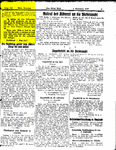Yamato
Legendary member
- Messages
- 9,840
- Likes
- 246
OK, one last analysis of this song, with colors separating the parts where she sings from where she talks. It's funny because I was wondering: what is really the difference between talking and singing? There is really a fine line, because we have musical notes while we talk as well. Furthermore, she talks in a way that the difference is almost imperceptible and she switches very often. It's tricky, but I'll take the challenge.
I will mark in red the parts where she talks.
One more remark.
She doesn't sing "süßen Träumereien" but instead "süße Träumerei". Yet I will still write the plural version of it, for I am convinced it's her mistake, for the following reasons:
1) "Bei" takes the dative case, "Träumerei" is a feminine noun. So, we would need to decline the adjective in the strong declension (there is no article) dative feminine, and that is "süßer", yet she doesn't sing it. Cf. duden.de:
http://www.duden.de/rechtschreibung/suesz
"süßer"
She sings "süße Träumerei".
2) all rhymes make us opt for "süßen Träumereien", because that is the ending of 3 other lines in the same 6-lines verse (or whatever the technical terms are).
3) last but not least: all other singers sing "süßen Träumereien"
Ok, here goes my analysis:
Wenn mir dein Mund nun tausend Schwüre aufschwört
wenn Du auch klagst und weinst.
Was heute geschah, hat unsere Liebe zerstört,
nie wird es mehr wie einst.
So wird es nie wieder sein.
Bei Kerzenlicht und Wein,
bei süßen Träumereien.
Beim wandern durch die Felder,
irgendwo im Sonnenschein.
Wie herrlich das war.
So wird es nie wieder sein.
Bei zarten Melodien,
beim Feuer am Kamin.
Wir fühlten unsere Herzen
wie im heißen Fieber glühen.
Wie herrlich das war.
Nur keine tragischen Szenen,
und nur keine Klagen und Tränen.
Wenn wir uns auch quälen und sehnen,
denn so ein Glück kommt nie zurück.
Ach, so wird es nie wieder sein.
Wie einst beim ersten du,
beim ersten Rendezvous,
dem Buch der großen Liebe schlug
der Wind die Seiten zu.
Siehst du wie ich lache, nimm auch
du es nicht so schwer!
Ich dank dir so sehr!
(whistling)
Siehst du wie ich lache, nimm auch
du es nicht so schwer!
Ich dank dir so sehr!
Gee, I can't remember another song where someone switched between talking and singing as many as 8 times! This is being an excellent exercise for my German, for my singing, and for my focusing on listening.
Hey, look, she does it a lot, this alternating between singing and talking:
It's crazy, trying to keep up with her. She sings fast and changes all the time. Much easier to follow when she sings than when she talks.
Another interesting related clip: she was an early TV star, in the early 1940s:
This was one fascinating clip, on the early years of German television.
https://en.wikipedia.org/wiki/Ilse_Werner
Ilse Werner (née Ilse Charlotte Still, 11 July 1921 – 8 August 2005) was a Dutch-German actress and singer.
She was born in Batavia (present-day Jakarta) to a Dutch father, merchant and plantation owner, and a German mother. Werner was a Dutch citizen by birth; although she had her greatest successes in Germany, mainly during the time of the Third Reich, she did not assume German citizenship until 1955.
Wow... speaking of Dutch singers during the 1940s. I just came across an engrossing movie (although not a masterpiece) by the famous action movie Dutch director Paul Verhoeven about a Dutch jewish female singer during world war 2. I can't stop watching it, by how captivating it is (not a masterpiece but action-packed):
https://en.wikipedia.org/wiki/Black_Book_(film)
You can watch it streaming here:
http://vidspot.net/p7hu96v3t4ln#
http://vodlocker.com/gfmrdrj3y6xc
https://en.wikipedia.org/wiki/Black_Book_(film)
Black Book (Dutch: Zwartboek) is a 2006 Dutch World War II thriller film co-written and directed by Paul Verhoeven and starring Carice van Houten, Sebastian Koch, Thom Hoffman, and Halina Reijn. The film, credited as based on several true events and characters, is about a young Jewish woman in the Netherlands who becomes a spy for the resistance during World War II after tragedy befalls her in an encounter with the Nazis. The film had its world premiere on 1 September 2006 at the Venice Film Festival and its public release on 14 September 2006 in the Netherlands. It is Verhoeven's first film made in the Netherlands since The Fourth Man, made in 1983 before moving to the United States.
Country
Netherlands
Germany
UK
Belgium
Language
Dutch
German
English
Hebrew
Budget $21 million
Box office $26,768,563
Yo, this movie is so packed with action that when I stopped to write this post, I felt that it was almost finished by how much action I had already seen, and instead I now just found out that I am less than half way through it. This movie is good for learning foreign languages. It's got 4 languages in it, constantly subtitled in English.
Not a masterpiece but so action-packed and interesting that it will keep you glued to your seat. However it is not an historically accurate and not a movie for history's sake, but rather an action movie set in world war 2. At the beginning they say it is based on true events, but they probably put together 10 different true events, mix them up, so they could come up with an entertaining, but totally unrealistic plot. This is science fiction that pretends to be history. Engrossing but historically meaningless. From an historical point of view, this movie was entertaining garbage. I would not recommend it. There are much better movies, although I admit that it was entertaining.
...
Holy cow! At minute 85 of the movie, they play Ilse Werner's 1941 song, "Ja, das ist meine Melodie" (authored by Bochmann/Balz), the one I posted in the very post I am quoting (before knowing it):
Last edited:









